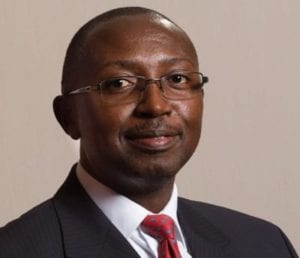An interview with CESA President, Abe Thela
For the consulting engineering industry to thrive, it needs to be free from corruption, subject to holistic tendering processes and able to attract and retain young talent. Vice president of Consulting Engineers South Africa (CESA) – and soon-to-be president – Abe Thela, looks at the bigger picture and makes a whole lot of sense. The anti-corruption fund was establishedby CESA earlier in the year. How has this progressed? The fund is still active and the anti-corruption hotline is active. People are encouraged to use this to report any corruption. It has been used –but the reported issues were largely ones we could not follow up on. Problems arise if the reporting is too late. We had a large case reported in Mpumalanga, but the project was almost complete so it was fruitless for us to move on it. We have teamed up with attorneys Moore Stephens,which specialises in forensic investigations. I must emphasise that it is important forpeople to report cases as soon as they can; preferably while the tenders are still at tender phase. South Africa retains strong institutions, such as the Public Protector. Is there cooperation between CESA and that body? Indeed!If it is going to help the situation, we would cooperate and assist the Public Protector’s office; corruption has the potential to undo South Africa’s development. Many things are at stake –the public’s money must be safe, quality infrastructure must be built, and basic services need to be provided. Corruption stands in the way of all of that. A culture of honest business – an honest day’s work for an honest day’s pay – is something intrinsic to a culture. What can be done to raise this again? I can only talk about consulting engineers. What I know about other disciplines is simply what I read in the paper. Regarding consulting engineers, I still want to believe that we are an honest group of business people. Last year, our president, Naren Bhojaram, was determinedly focused on the unquestionable ethics of consulting engineers. It always takes two to tango, and if there were any signs of corruption we would want to route them out. At CESA, we have a disciplinary committee that deals with our members and we welcome anyone to approach CESA to help us route out unfair or corrupt practices. What else is a challenge to the industry right now? I think the biggest issue at the moment is procurement. Of course, corruption is part of that system, but if you look at what used to happen, consulting engineers did not have to bid for work.It is only because of the new procurement system that we now have to, and in my opinion that might increase the risk of corruption, particularly when work is scarce. However, the real problem affecting consulting engineers is that our services are nowprocuredprimarily on price and BBBEE. Quality is entirely absent. When one considers the complexity of some specialist projects, they demand the kind of creativity, innovation and foresight that comes only with exceptional expertise and experience. Alternatives must be considered and multiple solutions provided. Quality used to be a high consideration in tenders, but a case brought by a contractor some years back attracted a court ruling that removed quality from the system. The result is that tenders are now almost exclusively awarded on price BBBEE, omitting some of the most critical factors. This is extremely damaging and a threat to quality, and sustainability the community. CESA urgently wants quality to be reintroduced as part of the procurement points, with 40 points going to quality and 50 to price. How is CESA going about achieving this? CESA has made a presentation to treasury and our procurement concerns were one of the top concerns we raised. The other item we requested was procurement of professional services. Procurement of construction related work should be separated from other services. We design from scratch and incorporate an extremely broad spectrum of the totality of the project. We are ultimately responsible for the built environment we live and work in. In procuring other goods – you’re simply picking it out of a catalogue. South Africa needs a dedicated system for construction related procurement. How did Treasury respond? IT responded positively. Its process is exacting in the sense that it must assess how the proposed changes might impact on other regulations but it is committed to reviewing the procurement system. We are not sure if we will get what we are looking for, but we have recently made more representation around the Public Finance Management Act(PFMA). It is a working document until a draft for public commentis brought. We need to keep repeating this. The other issue we raised is that we want committees in government that deals with supply chain management to include professional engineering personnel. To adjudicate tenders, you need experts on board. Without experts, all that is focused on is the bottom line, instead of the bigger picture. This is killing our industry. People tender lower and lower and you end up in a price war. The current situation in the industry is that we cannot train people – we don’t have the funds to train or innovate, we can only do the basics with no alternatives. We believe consulting engineering is the frontrunner of any infrastructure development and requires more attention than this. An extremely serious consequence of the status quo is that awarding tenders by treating consulting engineers as commodities is ignoring lifetime costs of structures. This is not sound economics. Should tenders not include lifetime costs?As I said, they are mostly looked at in isolation from lifetime costs. Yet we are the ones who have the impact on those costs. At the moment it is estimated that the cost of consulting engineers on any project is only 2% of the total costs. If you reduce us to commodities and make awards based mostly on price, you are then not able to impact positively on the lifecycle. This affects so many things. If we don’t change this direction, we will drive away good engineers. If we can’t train our engineers and pay them well, younger engineers will look for greener pastures. They make good managers in other industries and if we can’t compete, we will lose them. We need them badly;not only for the National Development Plan but at this stage, simply to maintain the infrastructure. Without engineering skills, there is no National Development Plan. For the economy to function you need power supply, roads, water – why else are we building new power stations? Without a critical number of consulting engineers, this infrastructure will not get built.
Are these issues properly understood at national government level? The PFMA are listening – we are seeing this since our first meeting with them over a year ago, but these matters take longer to resolve than we might want, so patience is required of us. We understand the sensitivities of the regulatory mechanisms. And we are not the only stakeholders who want to see change on our particular fields. And the changes we are looking for in the PFMA will impact directly on the Municipal Finance Management Act, and so on. So yes, we are empathetic of the government’s processes, but we still believe things need to move quicker than they are doing now. Turning to global companies operating in the South African market and using the country as a springboard to other African countries, what impact does this have on local companies? Foreign companies are already moving in, with a strong local base and partnering with local companies. There are good reasons and it opens markets for South African firms. Apart from African markets, it also opens up markets overseas and for exchange of skills we might not otherwise have. If you are to tender in Mozambique, you are tendering against international firms that are keen on tendering on multibillion rand projects. How does the local industry compare to overseas one? When local companies tender north of our borders, they compete with foreign firms and do well. And of course, if we didn’t measure up, they would not be partnering with us as they are. We see senior engineers taking on key positions within overseas firms – so we are up there with the best of them. What we wouldlike to see is some of those personnel in the public sector. How can we invite more engineers into the public sector? A municipal engineer makes that decision as a career – it’s vocational. The contract terms need tobe made more viable, however, with job security beyond five years. There is much that can be done to make the vocation more attractive. How has the introduction of the Integrity Pact gone? We wanted it to be part of every tender. We did not achieve this, but it is still alive and we will not stop until it is ingrate into regulations or tender documentation. CESA Conference 2013 is fast approaching; what outcomes are you hoping for? Issues of sustainability are becoming increasingly important. Leadership is key to sustainability. This does not only refer to environmental issues. We want to look at enterprise sustainability –the procurement system affects our sustainability. We will look at environmentalsustainability as well, as South Africa has committed itself to a green economy. This can only be achieved by making sure that everything we design allows our environment to survive us. It must sustain life – sustainability incorporates every aspect of what we do. We will also be looking at the National Development Plan. Our members really want to know where the country is going with regard to infrastructure development, so that is high on the agenda. We anticipate a fine conference and a lot of key decisions will emanate from it.






